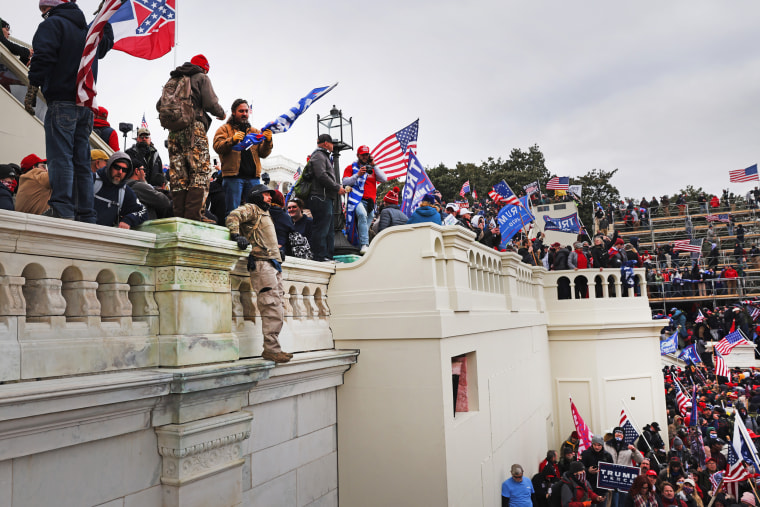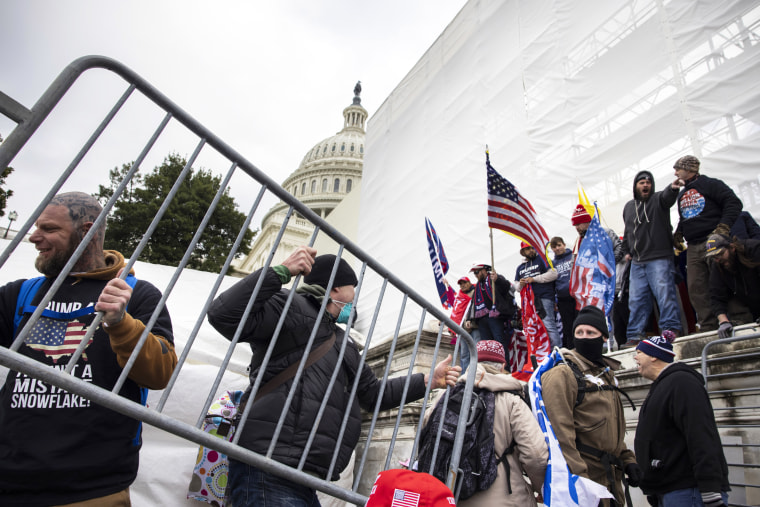A federal judge and the top Republican on the House committee investigating the Jan. 6 riot have now come to the same stark conclusion: There is evidence to suggest that Donald Trump’s efforts to void the 2020 election could be a crime.
Rep. Liz Cheney, R-Wyo., said last weekend that her panel had compiled enough facts to refer Trump to the Justice Department for criminal prosecution, while U.S. District Judge David Carter wrote the last month that Trump and others had undertaken “a coup in search of a legal theory.
Neither has the authority to press charges against the former president. That’s up to Attorney General Merrick Garland, who has so far focused on the people who stormed the Capitol in a fierce effort to keep Trump in power.
Trump denies any wrongdoing and his allies argue that Cheney has lost credibility as a fair broker. Highlighting Cheney’s continued criticism of Trump, Republican South Dakota Gov. Kristi Noem told NBC News, “I couldn’t see the point of it except that she was angry and bitter.”
But amid reports of a split in the House panel on Jan. 6 over whether to make the point directly to Garland that he needs to target Trump, the members seem completely united when he slams. another point: there could well be another coup attempt in 2024. and January 6 provided the blueprint for pulling it off.
That fear is helping shape their hearing plans, which are expected to begin next month.
“Our goal is to show the country how close we are to losing our democracy and why we’re not off the hook,” said House committee member Rep. Adam Schiff, D-California, at NBC News.

Members plan to hold public hearings that will lay out the evidence they have gathered and outline a multi-pronged effort to disenfranchise voters by giving the losing presidential candidate a second term.
The primary audience for the committee will be the general public; another is Garland. But to the extent that people watching from home are alarmed by what they’re learning, the hope is that it might pique Congress’s interest and provide fresh incentive to rewrite the 19th-century law that controls the process. used to organize presidential elections. After watching 2020 unfold, some elected officials and election experts are concerned that the Voter Count Act could be exploited in a way to give Trump or someone else a victory in 2024, whether they win enough votes or nope. No law even needs to be broken.
“A lot of what we’ve seen in 2020 and in the aftermath of the election has been testing the waters to see where there are weaknesses in the system of laws that governs us,” the Democratic Secretary of State said. Arizona, Katie Hobbs, to NBC News. If there isn’t “accountability and enforcement of these laws, we risk these things happening again,” added Hobbs, who is now running for governor.
Fake voters
One of the focuses of the Jan. 6 panel is the alternative, or what critics call the “fake” voters that surfaced in the last presidential election. Dozens of people from five swing states that President Joe Biden has won have signed documents claiming to be “duly elected and qualified” voters and declaring Trump the winner. (In two other states, New Mexico and Pennsylvania, the documents included caveats that their legitimacy hinged on Trump ultimately being declared the winner.)
The slates were sent to Washington, where Trump loyalists prepared to use them to his advantage. A memo written by John Eastman, a lawyer advising Trump at the time, set out several scenarios in which Vice President Mike Pence, presiding over the count, would recognize rival lists of pro-Trump voters, setting off a chain of events which ended with Trump’s victory. To Trump’s dismay, Pence did not follow suit. He ended up certifying Biden’s victory.
“The idea was to try to negate and overrule the electoral college votes by having the vice president proclaim these new powers and then exercise those powers by saying there was controversy and uncertainty in the state level and a disputed Electoral College situation,” Rep. Jamie Raskin, D.-Md., a Jan. 6 committee member, told NBC News. “There was not.”
Even loyal Trump supporters in Congress feared relying on surrogate voters whose nominee – Trump – hadn’t actually won.
In a series of text messages published Friday by CNN, Sen. Mike Lee, R., Utah, wrote to White House Chief of Staff Mark Meadows three days before the insurgency: “I wish I had wrong about my concerns. But I do think that all of this could seriously backfire on us unless the legislatures submit [T]rump slates (based on a finding that this was the correct outcome under state law). The committee did not comment on the text messages. Lee Lonsberry, a spokesperson for Lee, said, “The text messages tell the same story Senator Lee told from the Senate floor the day he voted to certify the election results for every state in the country.”
The Jan. 6 committee and the Justice Department are reviewing how these Trump voter lists came to be. On Thursday, the committee heard eight hours of testimony from Stephen Miller, one of Trump’s top White House advisers, who spoke publicly about the alternate voters in December on the day of their rally.
Miller’s appearance before the committee presumably gave members a chance to probe how Trump’s forces believed Biden’s victory could be undone.
Committee aides also traveled to Arizona and spoke to Hobbs about other efforts to “change the results” in her state, she said. One of two groups of pro-Trump surrogate voters claiming to represent Arizona used the official state seal in documents sent to Washington, giving them a patina of legitimacy.
“It’s important to understand how they were basically recruited to do this,” Rep. Elaine Luria, D-Va., who sits on the Jan. 6 panel, said of the alternate voters. “Have they been recruited? Were they under pressure? … Where does the direction come from – go to the United States, find these people and have them sign their names?
State officials are also trying to get answers. Hector Balderas, New Mexico’s attorney general, said he was part of a task force investigating surrogate voters with his counterparts in other states. Dana Nessel, Michigan’s attorney general, told NBC News, “If we don’t hold people accountable, there’s nothing going to stop them from doing it again, because there won’t be any repercussions.”
(Republican officials, Trump allies and lawyers for some voters said they were seeking to ensure that Trump’s votes would be counted in case he was ultimately deemed the winner in those states.)
The danger is that more groups will come forward in the future and misrepresent themselves as the real voters when in fact their candidate has lost. There is no guarantee that a bogus group of voters would be expelled in subsequent elections. All of this suggests an urgent need to revise the voter count law, some lawmakers and former officials said.
“Shadow of Menace”
Greg Jacob, Pence’s former legal adviser, was with him at the Capitol on Jan. 6 when rioters stormed the building and called for the vice president to be hanged. He balked at the strategy Eastman laid out in his memo and exchanged heated messages with him when the Capitol was invaded, according to emails released by the committee in a court filing last month.
“Until the Voter Count Act is brought into full compliance with the drafters’ design, every presidential election will take place in the shadow of the threat of possible attempts on January 6 [congressional] joint session to reverse the election result,” Jacob told NBC News.

Congress is trying to strengthen the law, but with little to show for its work. For much of the past year, Democratic lawmakers who control both houses have instead focused on broader electoral reform aimed at expanding voting rights. This initiative collapsed. Senate Democratic Leader Chuck Schumer has sometimes described the parallel effort to overhaul the Voter Count Act as an unwanted distraction.
“There were a number of nefarious parties and actors in 2020 who tried to weaponize the voter count law in a deeply problematic way,” said Rep. Joe Neguse, D., Colorado, who served as a prosecutor. of the House during Trump’s second impeachment trial. , told NBC News. “It seems like a component of that was this notion of fake voters being sent by states, so I think that’s an area we need to reform and we have very little time to do that.”
What seems most likely to pass, if at all, are a few fixes with broad consensus. Congress can clarify that the vice president only plays a ceremonial role when it comes time to count electoral votes and cannot, as Trump has argued, unilaterally overturn the result in some states. Lawmakers can also raise the threshold so that it takes more than one member of the House and Senate to oppose a state’s electoral votes and thereby delay official certification of the new president’s victory.
One solution proposed by election experts is to give the courts the final say in disputes over the list of voters to be counted. That way, in an age of extreme partisanship, members of Congress and governors aren’t the ones to settle disputes over who becomes president.
“The more important question is how do we make sure there are no political actors in Congress or in state government who can elevate these fake voters to something that could actually be counted,” Matthew said. Seligman, a Yale Law School fellow who advised Congress on how best to revamp the voter count law, according to a Senate aide. “And, unfortunately, that’s exactly what the law allows.”
It is by no means certain that the law will be changed in time for the next presidential election. Sen. Jeanne Shaheen, DN.H., is part of a bipartisan group of senators working to overhaul the Voter Count Act. “It is not clear” that the negotiations will lead to the passage of a bill, she told NBC News. “First, the group that worked must come to an agreement. And then we have to get the agreement of the leaders on both sides.
“I see that as a problem,” Shaheen said of alternate voters. “It remains to be seen whether we can agree on how to remedy this. »
